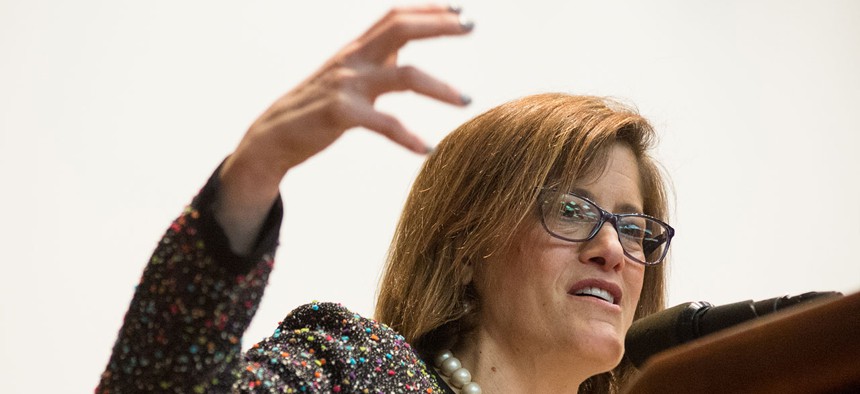
Beth Cobert speaks at USDA in March. Lance Cheung/USDA
Senators Push for Acting OPM Director’s Confirmation
Obama’s nominee has bipartisan support, but one senator continues to block a vote.
A group of lawmakers is renewing a push to make the acting head of the Office of Personnel Management its official, confirmed chief, noting her nomination has languished for seven months.
Both Maryland’s Senate delegation -- Barbara Mikulski and Ben Cardin -- and Virginia’s -- Tim Kaine and Mark Warner -- all Democrats, wrote a letter to Majority Leader Mitch McConnell, R-Ky., asking him to bring Beth Cobert’s nomination to a vote. Cobert was named acting director in July 2015, nominated by President Obama in November and approved by the Senate Homeland Security and Governmental Affairs Committee in February.
Sen. David Vitter, R-La., has held up Cobert’s nomination with a legislative block since February. At issue, he has said, are internal deliberations that led to OPM’s October 2013 decision to allow lawmakers and congressional staff to continue receiving government-sponsored health care subsidies after the Affordable Care Act forced them off the Federal Employees Health Benefits Program and onto the law’s new exchanges.
The Maryland and Virginia senators said in their letter those rules were written in 2013, before Cobert worked at OPM, and therefore her nomination should not be held up on their account. Vitter has blocked a vote, they said, “despite bipartisan support and appreciation for her qualifications among Republicans and Democrats in both chambers of Congress.”
They said “stable leadership is needed” at OPM to address outstanding issues like boosting cybersecurity in the wake of the data breaches that exposed the personal information of millions of federal employees and other individuals, the retirement backlog and improving the background investigations process.
“Given the scope and magnitude of these challenges,” the senators wrote, “it is unfortunate that one member of the Senate has continued to hold Ms. Cobert’s nomination for ideological reasons completely unrelated to her qualifications and performance.” They added a failure to vote was “hamstringing the agency at a moment when strong leadership is sorely needed.”
The lawmakers pleaded with McConnell to “assuage concerns” within his caucus so the Senate do away with the “gamesmanship” preventing Cobert’s confirmation.
Vitter has hounded the Obama administration over the legislative branch health care subsidies since it issued the rule in 2013, initially by sending a letter to then acting OPM Director Elaine Kaplan and later by blocking the confirmation of Earl Gay to serve as the agency’s deputy director over the same issue.
“Any potential OPM Director needs to explain the unnecessarily secretive process that protects members of Congress from the burden they imposed on American citizens,” Vitter said in February. “Congress should be required to live under the same health care laws they imposed for the rest of the country. That’s just commonsense.”
The proposal to remove lawmakers and their staffers from FEHBP was originally put forward as a political gambit, attempting to force Democrats to cast an embarrassing vote to opt out of one of the ACA’s major provisions. Democrats called the bluff, however, and the amendment passed easily. In implementing the law, OPM determined it would still provide the same subsidies to legislative branch employees they received while enrolled in FEHBP.
Vitter’s block is not the only hurdle Cobert must overcome; she also faces a challenge to her eligibility to serve as acting OPM director since her agency’s inspector general published a legal interpretation saying her November nomination negated her subsequent actions running OPM.







